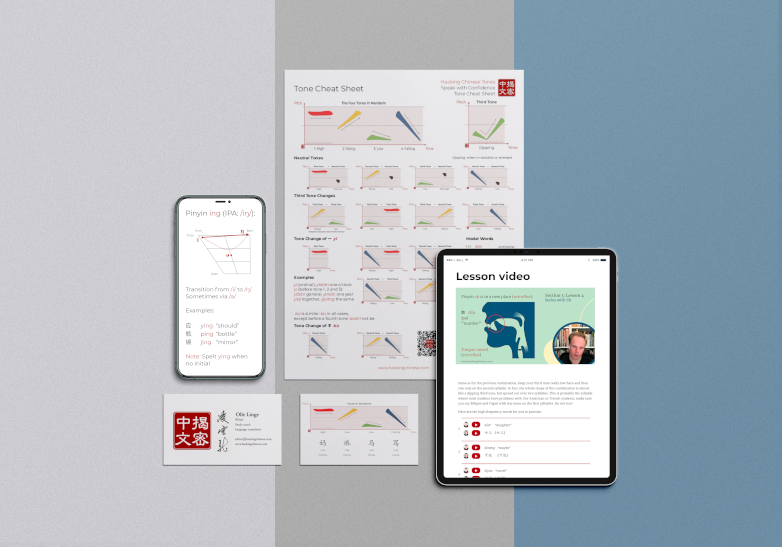 Speaking a foreign language fluently requires many things to come together at once. You need to decide what to say, retrieve the right Chinese words from memory, string them together to form sentences and pronounce them clearly.
Speaking a foreign language fluently requires many things to come together at once. You need to decide what to say, retrieve the right Chinese words from memory, string them together to form sentences and pronounce them clearly.
To speak fluently, you need to do all this smoothly and quickly. If you need to think about each step consciously, you won’t sound anywhere near fluent, even if your words are accurate and correct. In this article, we will explore the cheapest and most convenient way to speak Chinese fluently!
Tune in to the Hacking Chinese Podcast to listen to the related episode:
Available on Apple Podcasts, Google Podcast, Overcast, Spotify, YouTube and many other platforms!
Learning to speak Chinese fluently
There are many models for how language learning works, ranging from those that put almost all emphasis on listening to those that urge you to speak from day one and keep speaking whenever you get a chance.
No one doubts the importance of input (listening and reading) for language acquisition. After all, when you focus on output (speaking and writing), you can only use words and sentence patterns you have previously been exposed to, which happens through listening and/or reading. This means that listening is more important than speaking, something, something I explored in this article:
Is speaking more important than listening when learning Chinese?
Practice makes perfect
That doesn’t mean that speaking is useless, however. As mentioned in the introduction, simply knowing words and grammar is not enough; you also need to be able to retrieve and combine these quickly and smoothly. This process can be significantly sped up through practice. While you might not learn new things, you learn to use what you already know more efficiently, and this matters! I explored this topic more here: How to become fluent in Chinese.
The first time you try to recall a word from memory, it’s slow; it might take several seconds or longer. Accustoming your mouth and brain to new speech sounds and tones takes practice. Memory traces need to be reinforced, neural wiring needs to be enhanced, and muscles need fine-tuning. All this requires practice.
As argued in the article linked above, fluency is not about knowing every word in the Chinese language; it’s about using what you know well.
Speaking to yourself: The cheapest and most convenient way to improve your spoken Chinese
In this article, I will discuss a strategy for improving your spoken Chinese, which consists of only speaking (no listening), or not even that, only thinking about speaking. The cheapest and most convenient way of practising speaking is to speak to yourself, or if you’re not alone, think to yourself in Chinese.
But wait, is talking to yourself a viable learning method?
Yes! While it has some obvious drawbacks, it can be more useful than it might look at first glance.
Speaking to yourself in Chinese has some obvious benefits, such as being completely free and convenient to use the method whenever you want. That’s not true for many other methods for improving speaking ability on your own, such as recording yourself or mimicking native speakers (more about these later).
The most natural way to improve your speaking ability is to talk with others, be they strangers, friends or teachers, fellow learners or native speakers. I’m not saying that you should speak to yourself instead of speaking with other people; I’m saying that it can be a great supplement to that.
Why speaking to yourself in Chinese is helpful
Beyond the practical factors mentioned above, speaking to yourself is helpful because it speeds up several of the processes that speaking ability depends on. You will not learn new words by speaking to yourself, but you will become quicker at retrieving them from memory and using the grammar you have learnt to arrange words into sentences.
Most people already talk to themselves in their native language, for example, when trying to solve a difficult problem, considering the pros and cons of a complex situation or preparing for a presentation or speech.
 There is some research (see, e.g. Berardi-Coletta, Buyer, Dominowski & Rellinger, 1995) suggesting that verbalisation can make problem-solving easier, but that it’s not because of the speaking itself, but because of what mental gymnastics you have to perform to be able to say something aloud.
There is some research (see, e.g. Berardi-Coletta, Buyer, Dominowski & Rellinger, 1995) suggesting that verbalisation can make problem-solving easier, but that it’s not because of the speaking itself, but because of what mental gymnastics you have to perform to be able to say something aloud.
I haven’t found any studies in this area that deal directly with speaking a foreign language, though, but there’s no doubt that a lot needs to happen in your brain before any sound is even produced. The sounds that eventually come out are only the tip of the iceberg.
This is very clear when teaching. I constantly ask students questions where I know they know both the answer and how to answer it in Chinese. Still, this process usually takes time, even though it usually succeeds.
For example, if the students have learnt how to say the days of the week and the time of day, along with some basic verbs, they already have what it takes to make appointments in Chinese. Still, this takes a long time to begin with, but the process is sped up each time they try. They don’t learn any new words, but they do learn how to use the words they know more smoothly.
Another excellent example of this is learning basic numbers in Chinese. You probably learnt these words in your first few weeks of class, but it can take many years to get good at using numbers, especially the bigger ones. I wrote more about this here: Do you really know how to count in Chinese?
What to talk about when you talk to yourself
With a good conversation partner, speaking is easy, and there’s no lack of things to discuss. When you speak with yourself, however, the responsibility is entirely on you. So what should you talk about? Fortunately, there are many options, and here are some I like:
 Narrate what you are doing or what is happening around you – A fun challenge is to set a rule for yourself to name everything you touch in Chinese before you touch it. See how far you get every morning without encountering something you must touch but don’t know how to say in Chinese! I wrote more about this here: Vocalise more to learn more Chinese. More advanced students can describe what they are doing, what other people are doing or what’s happening in the vicinity. Remember, you don’t have to say the words aloud if inappropriate.
Narrate what you are doing or what is happening around you – A fun challenge is to set a rule for yourself to name everything you touch in Chinese before you touch it. See how far you get every morning without encountering something you must touch but don’t know how to say in Chinese! I wrote more about this here: Vocalise more to learn more Chinese. More advanced students can describe what they are doing, what other people are doing or what’s happening in the vicinity. Remember, you don’t have to say the words aloud if inappropriate.- Comment on things as they happen – Don’t just describe what happens; comment on it. Think of it as being the narrator of a movie where everyone can see what happens, and you’re doing the verbal commentary. This is similar to the inner monologue of a novel.
- Solve problems and make choices – Apart from being useful because you solve problems and make choices, doing so in Chinese can actually improve both your speaking ability and your problem-solving! As Daniel Kahneman highlights in his book Thinking, Fast and Slow (which you really should read if you haven’t already; there is a Chinese version: 快思慢想), cognitive strain makes people think more objectively. Speaking a foreign language counts as a cognitive strain; see this BBC article for an overview of the benefits of working in a second language.
 Imagine or invent dialogues – Just like many people do for an important interview, go through what you want to say in advance, imagine what the other person might say and how you can respond to that. Of course, you don’t have to limit yourself to realistic scenarios you might encounter in the near future. Role-playing is a great way to expand your horizons!
Imagine or invent dialogues – Just like many people do for an important interview, go through what you want to say in advance, imagine what the other person might say and how you can respond to that. Of course, you don’t have to limit yourself to realistic scenarios you might encounter in the near future. Role-playing is a great way to expand your horizons! Play word games with yourself – One of the best activities to practise oral fluency is word games, where you are supposed to describe a word in Chinese without using the word itself. If you think about it, not being allowed to say a word is similar to not knowing it, so playing this kind of game is excellent for developing fluency. It’s more fun with other people, but nothing stops you from playing these games with yourself!
Play word games with yourself – One of the best activities to practise oral fluency is word games, where you are supposed to describe a word in Chinese without using the word itself. If you think about it, not being allowed to say a word is similar to not knowing it, so playing this kind of game is excellent for developing fluency. It’s more fun with other people, but nothing stops you from playing these games with yourself! Get better at counting in Chinese – As mentioned above, learning Chinese numbers does not mean you can count. Can you count backwards? What about retrieving random numbers quickly? What about big numbers? Count things in your environment: count your push-ups, how many measures of water you add when you’re baking or how many steps there are in the stairs up to your office. If it’s too easy, skip every other number. Also, practise with random numbers whenever they appear, such as when using two-factor authentication or writing down a phone number. Read more here about why you probably aren’t as good at counting in Chinese as you think.
Get better at counting in Chinese – As mentioned above, learning Chinese numbers does not mean you can count. Can you count backwards? What about retrieving random numbers quickly? What about big numbers? Count things in your environment: count your push-ups, how many measures of water you add when you’re baking or how many steps there are in the stairs up to your office. If it’s too easy, skip every other number. Also, practise with random numbers whenever they appear, such as when using two-factor authentication or writing down a phone number. Read more here about why you probably aren’t as good at counting in Chinese as you think.
There are probably many other things you can do; these are just a few examples of what I have tried myself. If you have any creative ideas, please share them below in the comments!
Speaking aloud vs. speaking in your mind
Some of the activities above don’t work well in public spaces. Imagine sitting on the bus in your home country and seeing a stranger getting on. As he does so, he says, “I take a big step from the pavement onto the bus, now I swipe my public transport card, I see there are still some credits left, great, now I move further back in the bus, that guy looks a little bit weird I don’t want to sit next to him”.
Many benefits of talking to yourself can be reaped even if you don’t speak aloud. Many students ask questions about how to think in Chinese, and this is what I usually tell them. Start trying to have an inner monologue in Chinese. This isn’t as speaking practice as actually speaking aloud, but you still need to retrieve vocabulary, grammar and so on. You will also highlight things you don’t know how to say.
As I mentioned before, some research suggests that it’s not the speaking itself that is important, but rather the mental processes that lead up to speaking. Saying things aloud is not the same as subvocalising them, but they are more closely related than you might think. For example, articulatory muscles are activated when subvocalising, similar to how they are used when speaking aloud.
Other great ways to improve your speaking ability on your own
Here are three additional ways you can improve your speaking ability independently. None of them is as convenient as speaking to yourself, but the first two are free:
- Mimicking native speakers – The best way to improve your Chinese pronunciation is to mimic native speakers. But why, and how exactly should you go about it?
Improving your Chinese pronunciation by mimicking native speakers
- Recording yourself – Have you listened to a recording of yourself speaking Chinese, only to find that your voice sounds unfamiliar and strange, like another person? Then you’re not alone!
Get to know your Chinese voice to level up your speaking ability
- Enrol in my pronunciation course – One of the most severe drawbacks of talking to yourself is that it doesn’t work well for pronunciation. You might be saying the words incorrectly, and then practising more will make things worse, not better. Check out my pronunciation course if you want to make sure you get off to a good start or if you want to fix your existing problems!
References and further reading
Berardi-Coletta, B., Buyer, L. S., Dominowski, R. L., & Rellinger, E. R. (1995). Metacognition and problem solving: A process-oriented approach. Journal of Experimental Psychology: Learning, Memory, and Cognition, 21(1), 205.
Peñarredonda, J.L. (2018).The huge benefits of working in your second language: Working in another language can be awkward and challenging, but it has a surprising number of positive side effects. Available on BBC Capital: http://www.bbc.com/capital/story/20180525-why-using-a-foreign-language-could-make-you-better-at-work
Short, E. J., Schatschneider, C., Cuddy, C. L., Evans, S. W., Dellick, D. M., & Basili, L. A. (1991). The effect of thinking aloud on the problem-solving performance of bright, average, learning disabled, and developmentally handicapped students. Contemporary Educational Psychology, 16(2), 139-153.


1 comments
The famous Hungarian polyglot Kato Lomb mentioned in her book “How I Learn Languages” that she always talked a lot to herself when she was learning a new language. So if we are to learn from the great, we must conclude that speaking to yourself is really a very useful technique!